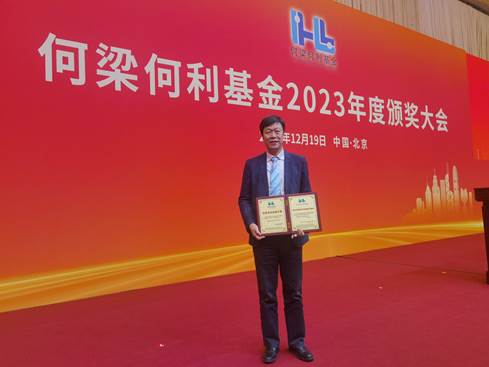
On December 19th, the 2023 He Liang He Li Foundation Award Conference was held in Diaoyutai State Guesthouse. Academician Chen Fahu, Distinguished Professor of Lanzhou University and Director of the Academic Committee of Key Laboratory of Western China's Environmental Systems, Ministry of Education, was honored with the Ho Leung Ho Lee Foundation Prize for Advancement in Science and Technology (Earth Sciences) in 2023 for his outstanding contributions to the direction of climate change, environmental change and the evolution of civilization. The 2023 Ho Leung Ho Lee Foundation Prize for Advancement in Science and Technology will be awarded to 32 outstanding scientists and technologists, which was previously awarded to Academician Yao Tangdong, a distinguished alumnus of the university, in 2001.
Academician Chen Fahu is engaged in the cross-study of climate and environmental change and environmental archaeology, and has made systematic and innovative achievements in loess records, climate and environmental change, and prehistoric human-environment interaction. Important research results include: Important research results include: First, a new viewpoint on the existence of a "westerly mode" of climate change in the central arid zone of Asia was put forward. He found that there is a significant difference between the humidity change pattern in the central arid zone of Asia and that in the Asian monsoon zone, and proposed a "westerly mode" of climate change in the Holocene, which was honored with the Second Prize of the National Natural Science of China in 2018. Second, he promoted the study of the Late Quaternary East Asian summer winds and loess dust in China. A framework of loess stratigraphy and climate records in the western Loess Plateau has been established, and several major drought events in the Holocene climate of the monsoon fringe region have been found; the reliable Holocene precipitation history of North China has been quantitatively reconstructed, and it has been found that strong dust storms and sandstorms have been induced by human activities in the historical period. Some of the results were honored with the Second Prize of National Natural Science in 2007. Third, a new understanding of prehistoric human dispersal and settlement on the Tibetan Plateau has been put forward. The Xiahe Denisovans, who were adapted to anoxic environments, were found to have lived in the northeastern Tibetan Plateau during the Middle Pleistocene, and the new idea that agricultural technological innovation caused by transcontinental exchanges contributed to the large-scale settlement of the Tibetan Plateau by prehistoric populations was put forward, which has promoted the international research on the prehistoric human activities on the Tibetan Plateau and their adaptation to the high altitude. His achievements have been selected as one of the "World's Top 10 Scientific Breakthroughs", "World's Top 10 Science News" and "China's Top 10 Scientific Advances" in 2019. He is currently the president of the Chinese Geographical Society, vice president of the Committee on Environmental Evolution of the International Geographical Union, vice president of the China Tibetan Plateau Research Society, and has been awarded the honors of National Advanced Worker, National Innovation and Pioneering Award, National Outstanding Professional and Technical Talent, etc. He has published 4 books and more than 600 papers in Nature, Science and other journals, with total citations of more than 35,000, and an H-index of 74, which makes him one of the top 1% of highly cited scientists in the international Earth sciences.
The Ho Leung Ho Lee Foundation (HOLEF) is a public welfare science and technology award fund established in 1994 by Hong Kong patriotic financial industrialists Ho Sin Hang, Leung Kau Kui, Ho Tim and Lee Kwok Wai, with the aim of promoting the development of science and technology in China, and rewarding scientific and technological practitioners who have made outstanding achievements and significant innovations. The Ho Leung Ho Lee Award Fund is the first social award system in China that is funded by the society, lasts for the longest time and has the greatest influence. The awards are selected annually and are divided into the Award for Scientific and Technological Achievement, the Award for Scientific and Technological Progress and the Award for Scientific and Technological Innovation, with the aim of recognizing Chinese scientists who have made outstanding contributions to the country's modernization, and a total of 56 scientific and technological workers were selected from 917 nominated scientists to receive the three awards in 2023, representing an award rate of 6 percent.